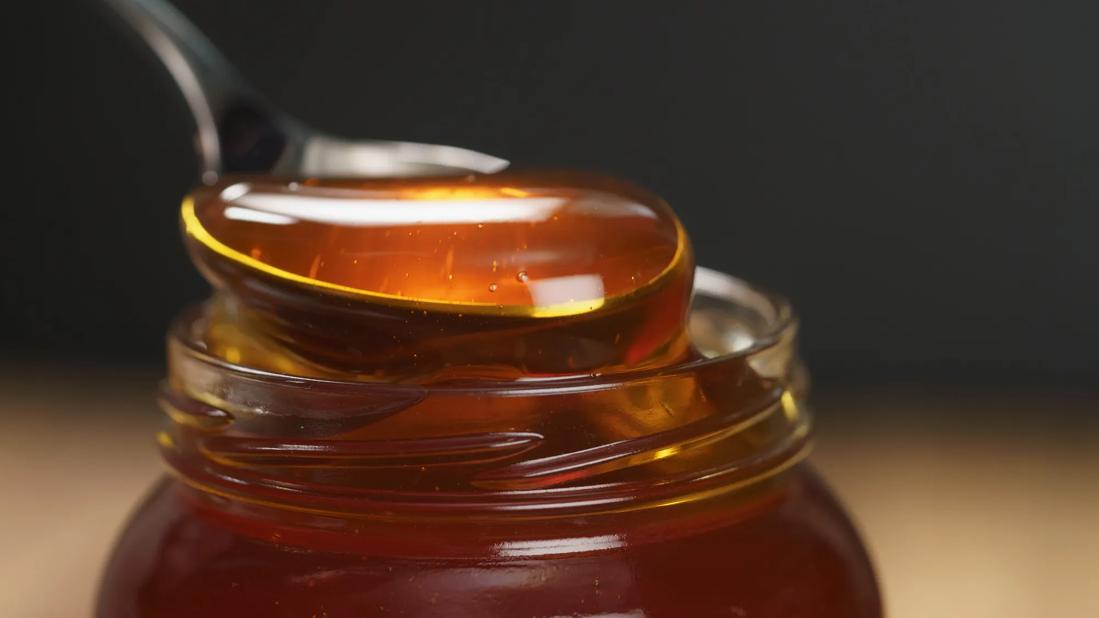Honey can help relieve a cough by lowering inflammation in your airways and loosening up mucus

Image content: This image is available to view online.
View image online (https://assets.clevelandclinic.org/transform/21d680cc-b1ba-436c-a1b9-50c23727cc95/spoonful-of-honey-1496854980)
Spoonful of honey from a honey jar
When a nagging cough keeps you up at night or results in worrisome side-eyes at work, you might reach for a bottle of cough syrup.
Advertisement
Cleveland Clinic is a non-profit academic medical center. Advertising on our site helps support our mission. We do not endorse non-Cleveland Clinic products or services. Policy
But a kitchen staple may actually work better than what’s in your medicine cabinet.
Family medicine specialist Elizabeth Rainbolt, MD, shares the sweet news about how honey can relieve a cough.
Honey is naturally anti-inflammatory, which means it works to reduce swelling in your throat and airways that leads to coughing. It also has antimicrobial properties to help your immune system fight germs that get you sick.
“Honey has been used as a natural cough remedy for centuries — and modern research backs it up,” Dr. Rainbolt reports. “For mild coughs, honey can be a safe and effective alternative to over-the-counter cough medications.”
What makes honey so powerful? Thank bees — and the plants they pollinate. When bees collect nectar to make honey, they also fly away with small amounts of vitamins, minerals, enzymes and other body-boosting nutrients.
Here’s why all of that good stuff makes honey a go-to choice for coughs.
Part of what leads to a wet cough — the kind that causes gunk to rise in your throat — is your body creating excess mucus.
Mucus helps trap viruses and bacteria so your body can kick them out. Coughing is one way your body rids itself of germs. But too much mucus can keep you coughing at all the wrong times.
Advertisement
Honey can help thin out mucus. That means you’re less likely to get gunked up, leading to less throat clearing and less coughing.
Coughing can also be a sign that the nerves in your airways are on high alert. And when those nerves are extra on edge, you can wind up coughing more.
Honey can help with that.
“Honey can calm the nerve endings in your throat that get triggered when you cough,” Dr. Rainbolt explains. “It coats the throat and soothes irritation, which helps reduce the urge to cough.”
One of the best things you can do to recover from a cold or other viral illness is to get lots of rest. But sleep can be a tall order when you’re plagued by a cough that won’t quit.
“Getting good sleep is key to recovery. Honey can help calm a nighttime cough and allow you to sleep so your body can recover,” Dr. Rainbolt notes.
The American Academy of Pediatrics doesn’t recommend using cough medicine in kids under the age of 4. What’s more, studies show honey may be more effective than common cough suppressants in children.
But never give honey to a child under 1 year old. It can cause infant botulism, a rare but serious illness.
Cough medicine can come with side effects like drowsiness, dizziness, nausea and more.
Honey? Unless you’re allergic, it doesn’t come with those risks. “It’s a simple, safe option that works for many people — and it tastes good, too,” Dr. Rainbolt says.
Honey is still sugar, so use it in moderation, especially if you have diabetes or are watching your sugar intake.
You can use honey for a cough by just swallowing a teaspoon or two straight. Or mix it into tea or hot water with lemon.
Pro tip: If you’re putting it in a hot beverage, allow your cup to cool a bit before adding honey. If it’s too hot, it can destroy the nutrients that bring on the benefits.
Not all honey is created equal. For best results to calm your cough, try:
“Light-colored honey is often filtered and pasteurized, which reduces its health benefits,” Dr. Rainbolt clarifies. “And honey blends are often diluted with other sweeteners, like corn syrup. So, they’re not the best choices.”
Advertisement
Honey works well for mild coughs, especially those linked to colds or seasonal allergies. But it’s not a cure-all. See a healthcare provider if your cough lasts more than 10 days, gets worse or comes with symptoms like fever, shortness of breath or chest pain.
Advertisement

Sign up for our Health Essentials emails for expert guidance on nutrition, fitness, sleep, skin care and more.
Learn more about our editorial process.
Advertisement
Honey, humidity and the right OTC meds can help bring on cough relief
Allergies, postnasal drip, asthma or reflux could be to blame for a cough that won’t quit
Dry coughs mean irritation, while wet coughs mean mucus
Germs spread quickly and easily, so covering your face, washing your hands and avoiding close contact are key
A chronic cough is one that lasts for eight weeks or more — and means you should see a healthcare provider
Over-the-counter options range from syrups to pills, lozenges to menthol rubs — but medication isn’t always the best treatment
Kids under 4 shouldn’t use cough and cold medicine — older kids may or may not benefit
Germ-killing chemicals in the water can lead to respiratory issues
Although it could be used as a moisturizer, this new trend is not recommended
Communicating clear limits helps protect your time, energy and emotional well-being
High cholesterol can be genetic, but testing and treatment can lower your heart disease risk